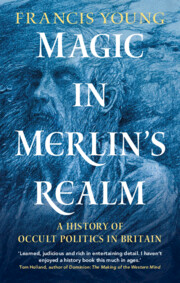
- Publisher:
- Cambridge University Press
- Online publication date:
- February 2022
- Print publication year:
- 2022
- Online ISBN:
- 9781009067133

Belief in magic was, until relatively recent times, widespread in Britain; yet the impact of such belief on determinative political events has frequently been overlooked. In his wide-ranging new book, Francis Young explores the role of occult traditions in the history of the island of Great Britain: Merlin's realm. He argues that while the great magus and artificer invented by Geoffrey of Monmouth was a powerful model for a succession of actual royal magical advisers (including Roger Bacon and John Dee), monarchs nevertheless often lived in fear of hostile sorcery while at other times they even attempted magic themselves. Successive governments were simultaneously fascinated by astrology and alchemy, yet also deeply wary of the possibility of treasonous spellcraft. Whether deployed in warfare, rebellion or propaganda, occult traditions were of central importance to British history and, as the author reveals, these dark arts of magic and politics remain entangled to this day.
‘The history of magic – in comparison to the history of witchcraft in Britain – has been under-researched in the Anglophone academy. The relationship of occult traditions to the politics of the realm has thus far been virtually ignored. A ground-breaking study of the history of occult traditions – of ‘high' magic (elite, literate, clerical and courtly) as compared to ‘low magic' (popular, non-literate, non-clerical) – is therefore to be warmly welcomed. This book is full of fascinating and previously little-known vignettes on the significant influence of the role of magic and the occult in the history of British politics, most of which will be unknown to the non-specialist. It would be an excellent text for undergraduate and postgraduate programs in the history of the occult.'
Philip. C. Almond - University of Queensland
‘A terrific book. Francis Young is quite correct to say that no such survey has been done before, and the evidence presented by him unequivocally demonstrates that politics in pre-modern Britain cannot be fully understood without some attention to the notion and practice of magic and the occult sciences in general such as alchemy and astrology. The author has also brought together a tremendous amount of scholarship in this volume which is commendable in its own right.'
Frank Klaassen - University of Saskatchewan
‘This is an important and accomplished project which demonstrates that – contrary to received opinion, and in modernity as well as the past – magical beliefs are central to political, religious and social lives, as conventionally categorised. I think the book will provoke much interest and comment with its claim that magic is as important as religion, and think too that there are likely to be over the next few years a series of books and theses that render that claim stronger. Magic's time has indeed come: and in that development the book will lead from the front. It will be accessible to a wide range of readers, written as it is with a light and engaging touch. The scope and detail never overwhelm, while the author's definition of magic and his inclusions and exclusions are convincing.'
Marion Gibson - University of Exeter
'Thought-provoking'
William Tipper Source: The Wall Street Journal
‘… an immensely readable book with an engaging style, and likely to capture the attention and curiosity of anyone who explores its pages … it is well researched and referenced, striking an excellent balance between scholarship and entertainment.’
Helen Hall Source: Law and Justice, the Christian Law Review
 Loading metrics...
Loading metrics...
* Views captured on Cambridge Core between #date#. This data will be updated every 24 hours.
Usage data cannot currently be displayed.